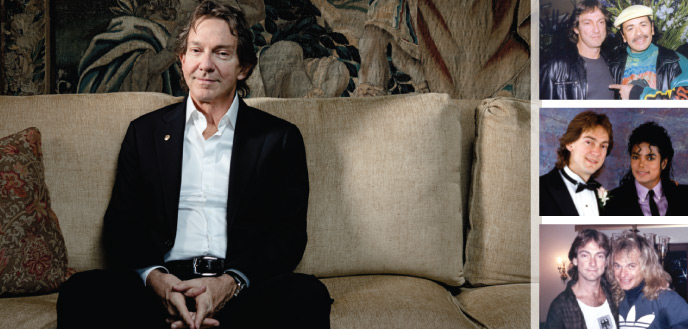
With a Hall of Fame clientele from the Beach Boys and Bee Gees to the Sex Pistols and Santana, John Branca '72 has taken the art of the deal to new heights—not bad for a kid from New York who opened for the Doors on the Strip at 16
Photo by Max S. Gerber
To call John Branca '72 simply a lawyer is like calling Carlos Santana a guitarplucker. Branca is, in fact, the dean of entertainment attorneys, a man who essentially redefined the job much in the same way that his biggest client, Michael Jackson, redrew the parameters of pop supremacy. More than 30 of his clients over the course of his 40-year career were voted into the Rock & Roll Hall of Fame, a list that includes the legendary Santana himself—a self-described "Mexican dishwasher who got lucky playing the guitar."
"Integrity is really important to me, and I feel very trusting and respectful of John's integrity above all," says the 10-time Grammy-winning musician, who was awarded an honorary doctorate of music at Occidental's Convocation in 2005 (a citation that Branca, as a trustee of the College, was instrumental in arranging). "I'm very grateful that the Great Spirit connected me with my brother John Branca."
Whether it's through divine intervention or the terra firma need for the best representation available in the cutthroat, ever-changing world of entertainment, Branca's skills have connected him with the cream of the musical crop. And those skills go far beyond contractual demands for, say, brown M&Ms on the rider.
"Entertainment lawyers are dealmakers, psychologists, therapists, and managers," says Branca, partner and head of the music department at Ziffren Brittenham in Los Angeles, the world's largest entertainment law firm. To be a successful entertainment lawyer, "you have to mainly have people skills," he adds. "If you sit down with Kanye West or Brian Wilson and you're super intellectual but you can't connect with them, you're never going to have an impact." That impact was recognized by Jackson, who wrote in his autobiography, Moonwalk, that Branca is "the kind of person that could do just about anything."
A native of Bronxville, N.Y., John Gregory Branca grew up in neighboring Mount Vernon, where his father—one of 17 children—ran a baseball school and served as the city's recreation commissioner. John R. Branca, who died in 2010, served two terms in the New York State Assembly and became chairman of the New York State Athletic Commission in 1983.
"My dad's whole life was about sports," says Branca, who encountered his father's legacy on a recent trip to his hometown. "A man came up to me and said, 'Are you related to John Branca? You look exactly like him. Not only did he give me my first job, but when I couldn't afford anything he gave me a football uniform to play Pop Warner.' It brings tears to my eyes."
Branca's mother was Barbara Werle, a professional ballroom dancer turned actress, whose screen credits include Seconds (1966) with Rock Hudson and three movies starring Elvis Presley: Tickle Me, Harum Scarum, and Charro! (The Branca Family Patio, dedicated in 1998 as part of the renovation and expansion of Johnson Student Center, honors his parents.) When John was 4, Barbara left her husband—and Mount Vernon—to pursue a showbiz career. "She'd come to New York to do 'The Ed Sullivan Show' or the Harvest Moon Ball, so I'd only see her maybe once a year," Branca says of that difficult time.
Music filled a void in his young life. "I started buying records when I was 5 or 6," says Branca, whose childhood collection of 45s included Danny and the Juniors' "At the Hop," the Silhouettes' "Get a Job," and the aforementioned Mr. Presley. At age 11, he came to Los Angeles to live with his mother, but the move wasn't sparked by the allure of Hollywood. "I just think I was trying to survive emotionally," Branca says. "It was really just coming out to be with my mom, getting away from my stepmom. I didn't have any grand ambitions."
Branca's mother made her only son take piano lessons—"which I hated"—but he began writing music in eighth grade. By the time he was 13 he was playing guitar and had started a band, the Other Half.
After some trouble with the police—"just little things"—Branca's mother sent him to boarding school. He spent almost three years at Chadwick School in Rancho Palos Verdes "until they expelled me," he recalls. "In 10th grade I got suspended twice, just for insubordination and long hair. I still have the letter they sent my mother, it's very funny. They said I had all the classic symptoms of a drug user—that I didn't give a shit about my studies, I didn't come close to living up to my potential, I was rude to teachers, you name it. In retrospect, it's an illuminating letter."
At the time, he didn't care, because he had formed a second group, the Pasternak Progress (named for bandmate Jeff Pasternak, son of film producer Joe Pasternak). "As soon as I got kicked out of Chadwick I got to start playing every night and we got a record deal," Branca says. "That was '66 or '67. We opened for the Doors. We were the house band at Gazzari's on the Strip. I was 16 at the time. It was incredible."
But rock 'n' roll glory was fleeting. "My mom told me, 'You're either going to go to college or you can get a job,'" he explains. "I didn't want to cut my hair, so I took the GED and went to L.A. City College."
He entered as a music major, but quickly discovered that was a bit different than jamming into the psychedelic night on the Sunset Strip. "I'd look around those practice rooms and I realized, I'm not really that good at this," he says, "so I got out of music." Branca excelled in other classes, however, and thus began his transition from a kid who'd "hated high school and junior high" to a blossoming student.
"I knew then, 'I have something,'" he says of his newfound academic confidence. After getting mostly A's at LACC, he transferred to Oxy as a junior, majoring in political science. "It was a whole other level of academic rigor," he says. "I loved Occidental. The professors were incredible."
Graduating cum laude and scoring well on the LSAT, Branca matriculated at UCLA School of Law, completing his studies in 1975. He took a position at Kindel & Anderson in estate planning—a "ridiculous" fit, he admits, "but I was happy to have a job at a top firm. I did really well on estate planning at UCLA"—and his professor, Susan Prager, served as Oxy's 13th president decades later.
A 1975 Time cover story on "Rock's Captain Fantastic," Elton John, prompted a career shift for Branca. "There was a quote from an entertainment attorney," Branca recalls. "I had never really thought about that job."
He started to think about it.
After applying to several entertainment firms, Branca was offered a position at Hardee, Barovick, Konecky & Braun in its corporate department reviewing contracts and setting up corporations for a client list that included Bob Dylan, Neil Diamond, and George Harrison. Branca's mentor, David Braun, "thought I was too square to be one of the music guys," he says. "They had a guy who set up corporations for Dylan and did the touring contracts, but he wouldn't get to hang out with the client. I got put in that division."
Branca handled all the clearance work for Renaldo & Clara—a docudrama-concert hybrid co-written, directed by, and starring Dylan, which was released in 1978 with a nearly four-hour running time. ("It's about the essence of man being alienated from himself and how, in order to free himself, to be reborn, he has to go outside himself," the future Nobel laureate told Playboy interviewer Ron Rosenbaum.) He was also tasked with talking Dylan out of investing in the business of "a friend from Minnesota who claimed he could extract hydrogen from water. [Braun] didn't want to be the one to tell Bob no, so I had to be the one to deal with this—which was ridiculous, but I got to spend time at Bob's house in Malibu when I was 26 or 27."
The turning point came in 1978, when Warner Bros./Reprise chairman and CEO Mo Ostin dispatched Branca to deal with the Beach Boys and their mercurial leader, Brian Wilson, after the group's attorney tried to deliver a Christmas album—on December 1, a bit late for the holiday season—to fulfill their contract with Warner (having signed a new deal with CBS). "I was this young punk of 27, but I stayed up all night long reading everybody's memos," Branca says. He ultimately wound up taking over the meeting—"There was one legal point that came up and I quoted something from a memo I had read"—impressing the Beach Boys in the process. "And I became their attorney. That was my first client."
Branca's stature quickly grew. In the realm of straight, cookie-cutter lawyers, he stood out with his rock-thin frame, longish hair, and hip wardrobe. It all appealed to a client list that would grow to include the Rolling Stones, Fleetwood Mac, John Fogerty, and Elton John himself. In 1980, Branca, then 29, met Michael Jackson, who had turned 21 and, fresh off the success of his breakthrough solo album, Off the Wall, was looking to create his own legal and management team apart from his family.
"Michael and I hit it off right from the start," Branca recalls. "Michael had a spark about him. He was funny. He was polite, he was inquisitive. He was always observing and learning." Though Jackson could be childlike, his lawyer says he had another side. "He was ambitious, driven, and competitive. He'd never accept second best."
During Jackson's lifetime, Branca was a force to be reckoned with, brokering heavyweight contracts as the star entered his solo heyday. In 1983, he scored an unheard of $1.2-million budget to finance the "Thriller" video (by selling Making Michael Jackson's 'Thriller,' a behind-the-scenes documentary, to MTV and Showtime—"It seemed odd that no one had ever thought of this before," Jackson wrote in his autobiography).
He spearheaded Jackson's 1985 purchase of the ATV Music Publishing catalog—which included the songs of the Beatles—for $47.5 million (outbidding Paul McCartney in the process). Jackson's estate sold its 50 percent stake in Sony/ATV to Sony last spring for $750 million.
"It took about a year," says Branca of the deal, "and along the way he had investment advisers who told him it was way too expensive. And Michael would listen and smile and say, 'Branca, get me that catalog.'"
Branca worked with Jackson from "1980 to '89 or '90, then I came back in '92 or '93," Branca says. "Then there were little gaps when some new person would come in. I stopped representing him in 2006." On June 17, 2009, deep into rehearsals for a 50-date residency at London's O2 Arena, Jackson hired Branca back. He died eight days later.
Fulfilling the instructions laid out by Jackson in his will (signed in 2002), Branca and music executive John McClain were named co-executors of the estate by Los Angeles Superior Court Judge Mitchell Beckloff. As Branca tells it, "We told the judge, 'This isn't like the estate of the guy who used to run Exxon where you can hire Bank of America—you've got to make decisions on albums and copyrights and movies. That's not for a bank."
"When Michael passed, it was a rough situation," notes attorney Howard Weitzman, whom Branca tapped as the chief litigator for the estate. With Jackson reportedly $400 million in debt, "It was an uphill battle to sell assets and see if there was anything left, so we were very concerned about the children. John—along with McClain—managed to turn this around. As a lawyer, he's about as good as it can get."
Branca and McClain's efforts were nothing short of extraordinary: A May 2013 piece on "60 Minutes" called it "the most remarkable financial and image resurrection in pop culture history." They made new licensing deals. They coaxed a $60-million advance from Sony Pictures for a documentary drawn from footage of Jackson's tour rehearsals (the resulting film, This Is It, grossed $261 million worldwide). They produced a pair of shows with Cirque du Soleil—a favorite of Jackson's—and released an album of new music, Xscape, that sold 1.7 million copies in 2014. The estate has been debt-free for years. "Our retail sales, I don't even know what they are anymore—$3 billion or something," Branca says.
"He knows the business better than anybody," says David Dunn, who has worked with Branca on a number of projects, including the Jackson estate, and is now managing partner of Shot Tower Capital, a boutique investment firm in Baltimore.
"John's at the complex intersection of the artistic and financial components," Dunn adds. "You've got artists who have particular viewpoints which aren't necessarily aligned with monetization, you've got labels and publishers who are more focused on monetization, and you've got John, who over the course of his career has been able to bridge the gap and translate in both directions."
Driving into the gated Beverly Hills community in which Branca has lived since 1992, even the birds seem to be hushed in awe. On these serene, manicured streets reside Rod Stewart, Brian Wilson, and Sylvester Stallone. Eddie Murphy lives across from Branca, Denzel Washington a few houses away.
Branca's own palatial estate (which he built) resembles a vine-covered Italian villa. He's collected Italian antiques for years. Rarely can one describe a home as "grand," but it fits here. The spacious living room where Branca sits for an interview is packed with lovingly curated memorabilia of his lifelong passions, baseball and music. There are photos signed by the Beatles, the Rolling Stones, and the Doors. One of Jackson's black fedoras sits at a rakish angle on the marble bust of a nameless Roman.
There are framed racks of baseballs signed by most of the game's greatest sluggers: Barry Bonds, Hank Aaron, Babe Ruth, Willie Mays, and Frank Robinson, to name but a few. Branca also owns one of the most comprehensive collections of baseball cards in existence, dating back to a 1915 Cracker Jack Ty Cobb. He has a lot of Brooklyn Dodgers ephemera as well, and for good reason: His uncle was Dodgers pitcher Ralph Branca, a three-time All-Star best remembered for delivering a ninth-inning fastball to New York Giant Bobby Thomson on Oct. 3, 1951, with the Giants trailing 3-2. Thomson's three-run homer into the left-field stands—the "Shot Heard 'Round the World"—sent the Giants to the World Series.
Uncle Ralph was also a great supporter of Jackie Robinson, who broke the color barrier by joining the Dodgers in 1947. "He may have been the first person in the clubhouse to have welcomed him at a time when there were a lot of racists on the team," Branca says. "They were lifelong friends."
Outside of his business and personal interests, charity work has been an enormous part of Branca's life. He co-founded the Musicians' Assistance Program in 1989, which partnered with the MusiCares foundation in 2004 to offer assistance to music industry folks in need. He's active in a wide variety of philanthropic, environmental, and animal causes and maintains strong ties with Occidental as a trustee. He also participated in a 2013 alumni panel on the music industry.
Even more recently, fatherhood—and baseball—brought Branca back to the Eagle Rock campus. "My 12-year-old son, Dylan, did a baseball camp two summers ago at Oxy, so I dropped him off every morning up at the baseball field," says Branca, whose offspring also include daughter Jessica, 28, and son John Connor, 14. He's been married twice—Little Richard presided over the first ceremony, with Michael Jackson as his best man—and is engaged now to model Jenna Nicole Hurt.
These days the power attorney remains active in the business, but "I'm a little more balanced now," he says. "I care more about my kids' welfare now, but I still get very excited about new music and new clients."
Now Branca focuses his energies on labors of love—like working on the Cirque du Soleil shows, or moving the Bee Gees' catalog to Capitol Records. "The idea that I had with Barry Gibb was, let's take the Bee Gees catalog and put it next to the Beatles, the Beach Boys, the Stones, and Frank Sinatra, and work with a frontline music guy who's used to breaking artists and will have fresh ideas on how to reintroduce the Bee Gees to a younger generation. To me, that's fun—it's not doing the same old thing."
His advice to those considering a career in entertainment law? "Music is not a growth business. Distribution is—Apple, Spotify. But being a music lawyer, the only reason you would do it now is because you love it. And that's why I did it."
Peter Gilstrap wrote "Urban Outfitters" in the Fall 2016 magazine.



